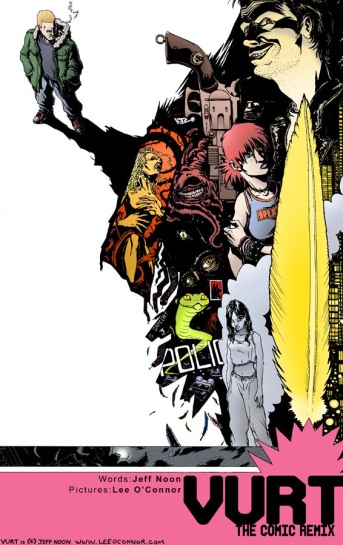
Take a look at Jeff Noon’s Website, and make sure to pick a copy of Vurt from your local bookstore.
Hello, my kittlings! Have you ever ridden the Vurt? Ridden that sweet, bloody, feathery, hallucinogenic descent into the twisted mind of Jeff Noon (not to be confused with the equally twisted mind of Jeff Koons)? Well, I just did, and oh, boy! What a trip!
From the first page, you’re thrust in over your head–kind of like the way some parents dunk their infant children in the pool, and supposedly it’s better this way because it’s like the amniotic fluids of the womb, and the little babies are just floating and confused but alright, and that’s what reading Vurt feels like. It’s sink or swim through a dangerous current of slang, drug paraphernalia and a terrifying landscape of the dystopic future, but there’s something utterly natural about Noon’s writing style. It’s cozily colloquial. It’s a stream of consciousness that’s easy to ride.
Vurt reads a lot like William Gibson’s classic cyberpunk novel Neuromancer and, “they” tell me, Anthony Burgess’s A Clockwork Orange (I’m afraid to say I haven’t read that cheery book yet), but it has influence of its own. Irvine Welsh’s Trainspotting was published the same year, and I see Noon’s alternate reality drug trip show up in Sci-Fi novels of the ’90s (like Greg Bear’s Slant), and go figure: everyone was still riding the decades-long popularity of heroin. Vurt is the heroin of Noon’s future Manchester.

No one can forget this creepy scene from Danny Boyle’s film adaptation of Welsh’s Trainspotting. So, imagine this scene and multiply its horror by five times. Now you’ve got Vurt.
This is the story of Scribble–an unlikely hero, a young vagrant just trying to navigate through a world too painful to live in–and his Stash Riders–Scribble’s unlikely sidekicks, a team of damaged kids trying to escape the traumatic landscape by riding any high available, whether its Vaz, cortex jammers, the alcoholic Fetish, or vurt. Vurt, a shortening of “virtual,” comes in the form of color-coded feathers and transports its users into shared dreams, alternate realities with varying degrees of risk, pleasure, and pain. It’s into the rarest and most dangerous vurt, the English Voodoo, that Scribble loses his sister and lover Desdemona (yeah, allusion much?!). Were we speaking of allusion? Scribble follows in the footsteps of Orpheus as he descends into the hellish English Voodoo to retrieve his love. Noon wins me over with the complex, colorful characters that Scribble meets along his harrowing journey, but the even greater triumph is the story: age-old and still powerful, tragic and beautiful.

Lee O’Connor authored an aptly creepy comic adaptation.
Now I hate to ruin my reputation as a bad ass, but I’ve never tried hallucinogenic drugs. That being said, reading this book has got to be pretty close. I’m horrified as it is, so any curiosity I may have had has now been squelched. Thanks, Jeff! This trippy novel takes you to the brink with its strange language and alien landscapes, just barely recognizable human society. It immerses you in a world where shadowcops read your mind, robodogs mate with vurtmen, and the experiences inside the vurt are more tantalizing, more real, than experiences in the bland, grey world of the sober. People use the vurt world to escape their wretched lives, and the whole point is you don’t remember reality when you’re in the vurt. There is only the dream, the shared experience. Scribble is cursed with the haunting: he feels and hears echoes of reality during his trip. He’s jarred into context because of this. It ruins his fun but gives him unique perspective on a whole world that has everyone else beguiled.
Vurt is an adventure. It’s a novel that will suck you in and make you forget about reality, trap you in a world you would like to think of as your own. I think Noon is victorious. I think he achieved what I assume to be his goal. I’ll definitely be reading more of him, especially the other books in the Vurt series: Pollen, Automated Alice, and Nymphomation.


